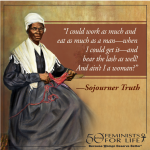Sojourner Truth was born into slavery circa 1797 and was originally named Isabella “Belle” Baumfree. Truth took on her new name later in life because she claimed to hear the Spirit of God calling on her to preach the truth, particularly about the abolition of slavery. The New York native worked as an abolitionist and public speaker who spoke Dutch as her first language but couldn’t read at a time when women in general were often forbidden to speak in public.
After being sold to multiple cruel masters, Truth eventually married, bore five children, and in 1826, escaped to freedom with her newborn daughter. When her son, then only 5 years old, was illegally enslaved, she sued for his recovery and became the first Black woman to win such a case against a White man.
Her extemporaneous “Ain’t I a Woman?” speech is one of the most often quoted addresses in history, although transcriptions of the event conflict, including whether Truth even said “Ain’t I a woman” itself. The first version of her famous speech was recorded by a newspaperman and abolitionist in 1851, shortly after she delivered it at the Ohio Women’s Rights Convention. He said it was “impossible” to record it accurately.
Truth died on November 26, 1883. Her funeral was attended by nearly a thousand people. Fellow abolitionist, suffragist, and former slave Frederick Douglass offered a eulogy for her in Washington D.C.: “Venerable for age, distinguished for insight into human nature, remarkable for independence and courageous self-assertion, devoted to the welfare of her race, she has been for the last forty years an object of respect and admiration to social reformers everywhere.”
In 2020, the Centennial Celebration of the 19th Amendment, Truth was honored as one of the first three real-life women to be represented in a statue in New York City’s Central Park, alongside fellow suffragists and abolitionists Susan B. Anthony and Elizabeth Cady Stanton.
Sojourner still speaks the truth to us today, helping us to understand that she enjoyed neither the privileges of men, nor White women.






